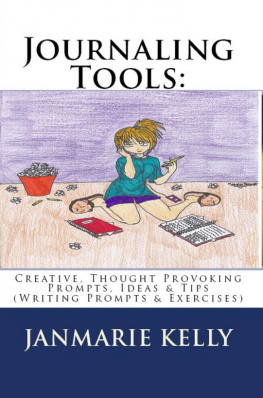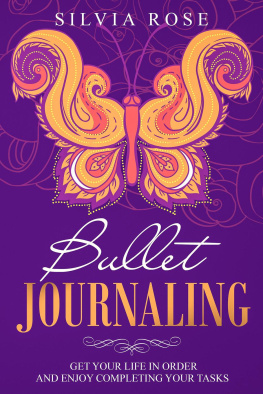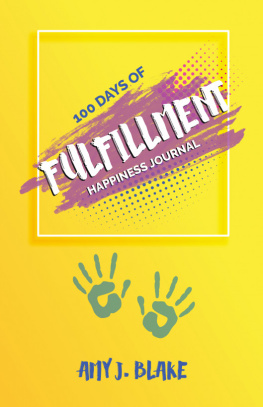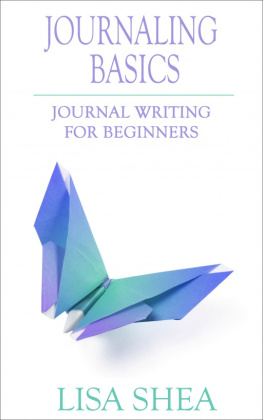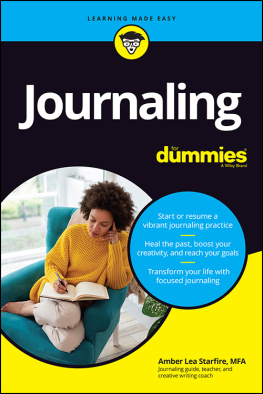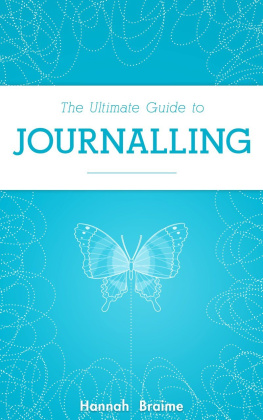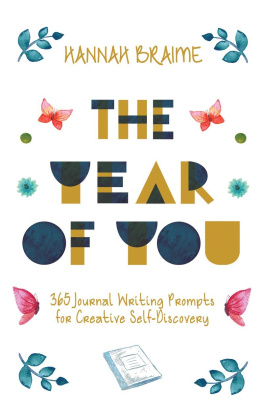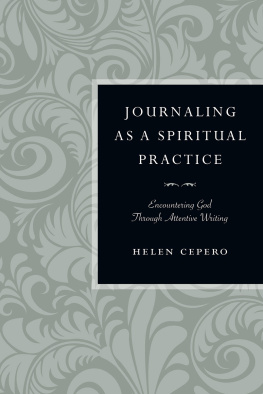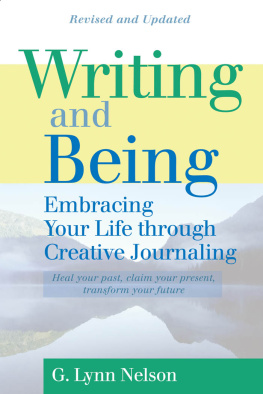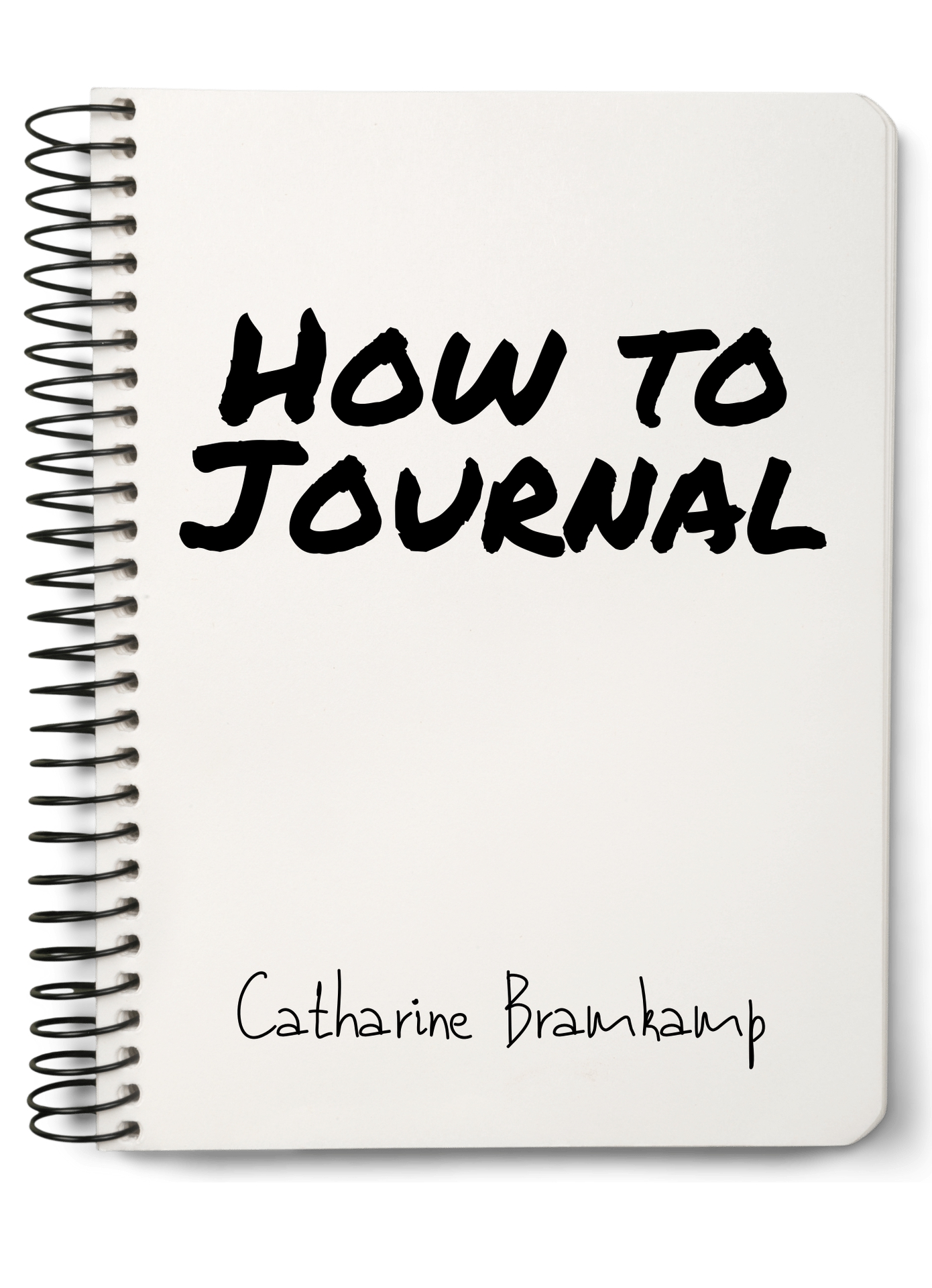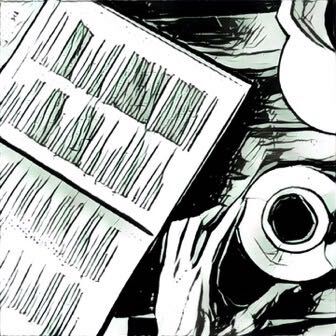Published by A Few Little Books
June 2020
Nevada City, CA
ISBN 978-0-9816848-4-0
All Rights Reserved
Why Journal?
Ive seen first-hand the transformation that writing - focused, purposeful writing - can do. If we all started our day with just ten minutes of reflection and intention, the world would be a kinder more tolerant place. We are all writers; we just need to get into the habit.
This journaling book is about the how. You will learn how to write, what to write and what kind of journal works best, and whether you need to handwrite, type, or talk.
This is about transformation because writing will change you, so it may as well change you for the better.
Goals
Writing down your goals automatically gives you a 70 percent higher chance of reaching them. What I love about journaling is it gives you space for more than merely listing the discrete steps towards a goal, it also provides space to ask why you are walking in that direction in the first place.
Stress
Write down all your complaints, stress, and anxiety before saying anything out loud. By taking the brunt of your frustrations, your journal can save relationships. Not only that, just expressing stress on paper will save your heart as well as your gut.
Change
Journal every day and pretty soon you will notice patterns of thinking, patterns of concern, repeat complaints. Transformative journaling will help break the complaint cycle and allow you to start solving your problems, all by writing it down.
History
Keep a record. Journals are the building blocks of memoirs and novels. You may think your life isnt startling or important, you are wrong.
Learn
Want to remember what youve learned? Write it down. Just the act of taking notes will help secure that idea in your mind, even if you never review the notes again.
Gratitude
If your family is tired of hearing you exclaim how grateful you are for the sun, the blue sky or the garbage pick-up (think of that, a stranger in a truck drives by every week and takes your trash away, what a marvelous invention!) write down your wonder. Journal about how you feel and what you love. Gush. When you are busy feeling and expressing gratitude, there is no room for fear or anger. But maybe just keep it in your journal.
Creativity
Daily journaling enhances and attracts creativity. As we will discuss in the chapters on passion and creativity, the Muse makes appointments. If you show up every day, pretty soon she will too.
Two key gurus if you will, of the journaling world are Natalie Goldberg and Julia Cameron, there are more, but these two writers have influenced classes, book series, and books like this one, so they deserve a mention.
Natalie Goldbergs Writing Down the Bones , combines writing with Zen Buddhist practices often conflating the two. Published 1986 it was revolutionary and her mantra, keep writing no matter what, spawned countless classes, practices, writers and in my case, a masters thesis. The Artists Way , published by Julia Cameron in 1992 furthered the idea of writing practice, creating art for health and sanity as well as writing for a specific time at a specific time of day. The Artist Way empire is formidable, but the subsequent books are pretty much the same rehash of the original theme of writing, not that I begrudge an author capitalizing on a good idea.
The essence of both authors approaches, seeped in two different decades (consider the audacity of discussing art during the 80s and 90s) is timed writing that draws straight from your subconscious, no chaser. To get what you want, you need to write around the conscious, editorial section of your brain so you can uncover and express greater truths and insights.
Sharing is not caring
Journaling your truth and insights are exactly what you are going for but do know that all that marvelous juicy writing is not necessarily ready to be shared either with close family members (perhaps especially not family members) nor with the greater reading public. If you want to share your wonderful insights, do! But edit first. Maybe even edit second. Contrary to popular myth, even though Jack Kerouac (under the influence of Cassady, Ginsberg, Snyder, the tenants of automatic writing, plus too much alcohol) wrote On The Road more or less spontaneously, he edited the work before publication. Contrast Kerouac against Gertrude Stein who believed every word that poured from her subconscious was publication worthy. Who are we still reading? Yeah. Write your truth, be spontaneous but dont think it is ready to drop into your blog. Its not. And that is more than okay. Managing and smoothing your writing is a much later activity. We are just discussing how to first to get it all down, just for you.
What is Transformative Writing?
Transformative writing is intentional writing to invoke change and increase well-being. Shaun McNiff a leading scholar on the expressive arts (and author of a most helpful book Trust the Process ), helps define the essence of transformative writing, Words become agents of transformation, shamanic horses that carry expression and transport people to change.
Numerous scientific studies by James W. Pennebaker and other scientists have shown that writing affects heart rate, blood pressure, and the immune system. The power of writing from the heart results in stress reduction and the restoration of emotional equilibrium. Are there graphs and double-blind studies? No, just results.
I saw the angel in the marble and carved till I set him free. - Michelangelo.
So has each author wielded the pen to liberate the creative spirit within. Each writer has discovered that words have the power to call upon angels and banish demons. Through writing, the self recognizes its identity with greater definition, harvests its wisdom, and wrestles with challenges, transforming them into building blocks of growth. - Pennebaker.
Writing and journaling is building, you will build on ideas, you will build using forms. You will build a better life. You can start right now or pick up where you may have left off years ago.
Remember our first journals? We wrote when we were sad, we wrote when we were happy, we often complained about the food. We wrote endlessly about our size, our hair, our tan lines and how none measured up because at the time, not being in vogue was a terrible tragedy. With a little perspective and years of journaling, and not a few cocktails with our best friends, we realize that no one felt in vogue and no one felt perfect. With those revelations in mind, during our last move, I cheerfully recycled years of teen journals. The poetry was bad, the complaints were monotonous, and the song lyrics were (appropriately) maudlin. The only thing I got right was my wishful description of the perfect man: tall, dark, handsome with glasses who happened to be brilliant.
Nailed it.
What I did not do or create in those early years was any kind of tangible, reportable change. Journaling helped get me through the years, but I dont believe I necessarily, consciously progressed, I simply outgrew the angst.
You, on the other hand, dont need to wait to outgrow your angst.


